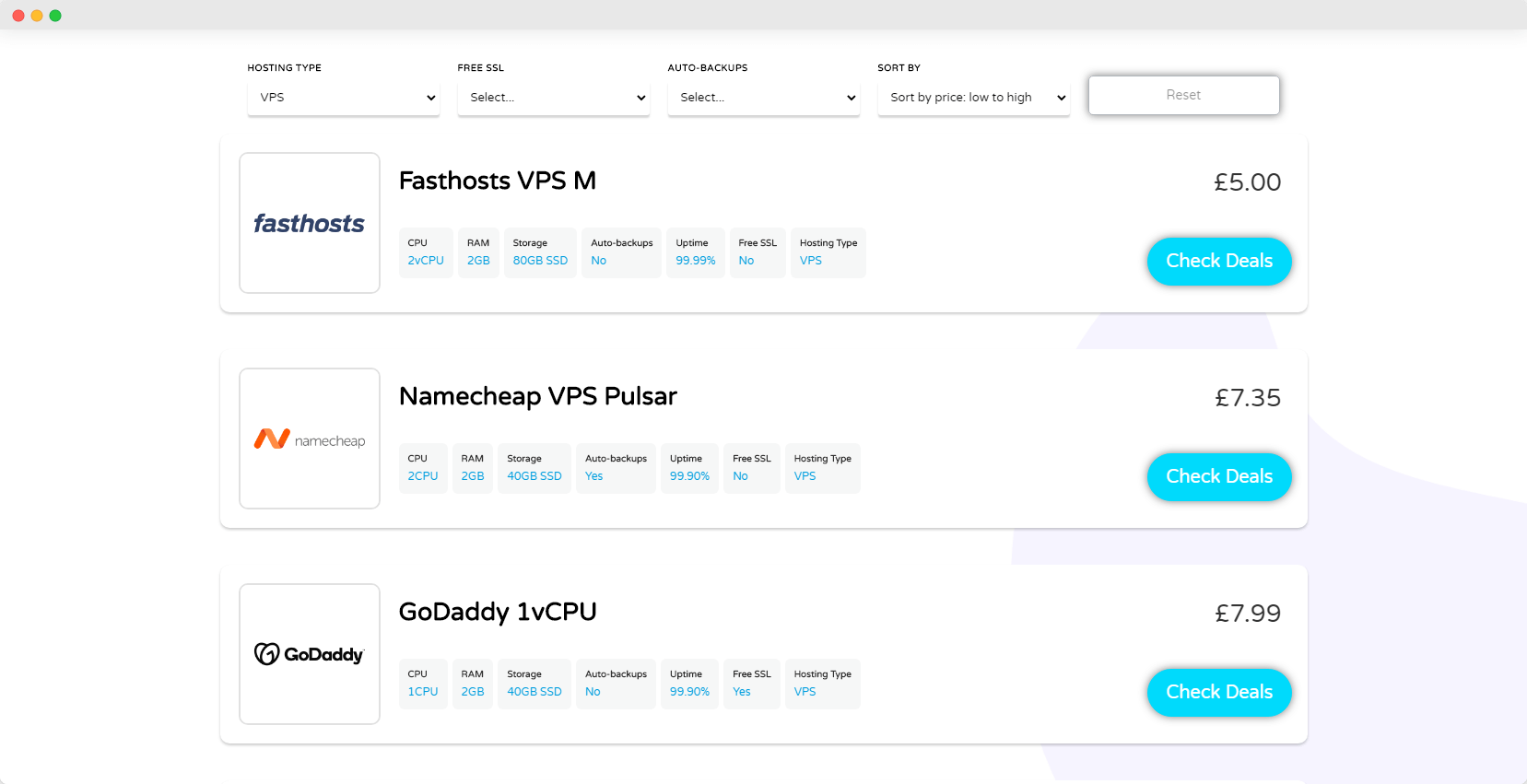
What is Web Hosting?
Once you’ve reserved your domain name and finished building your website, you’ll need a web hosting service to keep your site online.
Web hosting services do this by setting aside server space for your website and handling the traffic it receives.
Web hosting also provides a number of other services, such as security, storage, email addresses and regular website backups.
Choosing the right hosting plan is essential for your website to function correctly and provide a great user experience. With so many different hosting plans available, it can be overwhelming trying to choose what’s best for your business.
Compare web hosting packages to get a great deal.

Shared Web Hosting
This is the most basic kind of web hosting, and as a result, it’s also the cheapest. Shared web hosting is a great entry-level solution for new websites and blogs that don’t need a lot of storage and have minimal website visitors.
With shared hosting, you share a server resources with other clients, which helps to keep the cost low. Shared hosting isn’t suitable for larger websites with lots of visitors.
Cloud Hosting
Cloud hosting is a popular choice for many websites as it provides a reliable, secure and cost-effective solution.
Rather than relying on one server, your site is spread between a group of servers that support each other to prevent downtime (going offline). If your site experiences an increase in users, cloud hosting will scale-up to support the website. Private cloud hosting services are also an option.
Virtual Private Servers (VPS)
VPS hosting is step-up from shared hosting, although it’s similar in that your site is sharing a server with other websites. The big difference is your site gets a defined, private section of the server.
This means that your website will have it’s own resources and won’t be affected by the other websites. VPS hosting is a great choice for busy websites with lots of content, like an online store.
Dedicated Servers
With dedicated server hosting, you will pay to have your own server. In many ways this is the most powerful hosting as you have complete control of server set-up and configuration.
Some plans require you to maintain the server yourself or pay an extra fee to have it managed. Dedicated server hosting is best suited to large, busy websites that have technical expertise.
Compare Web Hosting Packages
What type of web hosting do I need?
Different types of web hosting services have different capabilities.
By understanding what each hosting service does, you’ll be able to choose what’s best for your website.
Find the best deal.
Compare Web hosting
Compare web hosting packages from dozens of the best providers to get a great deal!












Web Hosting Comparison
Web hosting features
Here’s the main features included with web hosting services.
Understanding what each of them are will help you choose the best hosting plan for your business, and the type of website you have.
RAM
RAM means random access memory. RAM is memory for temporary data when your website is doing different things (processes) at the same time. The more processes your website runs, the more RAM it will need. Websites with lots of features or ‘scripts’ will need more RAM avoid problems with the website loading slowly.
Storage
Hosting storage space is the total amount of space on a server to store files used to create your website. These files can be images, HTML files, website scripts and emails. If your website has a lot of files, you’ll need a larger amount of storage space. If you have a small blog or a small business website, you may not need as much.
CPU
CPU is a central process unit.
More CPUs store and process information faster. CPUs can get overloaded by multiple requests at once if your site is busy. This can cause the websites performance to suffer, slowing it down and providing a poor experience. If you have lots of website users, you will need a higher amount of CPUs.
Uptime
Uptime is the amount of time your hosting server and website is live without any technical problems. A server may go offline for a small amount of time for maintenance or technical issues. If there are issues with the server, it may crash, causing your website to go offline temporarily. You want uptime to be as close to 100% as possible.
Questions?
Compare Web Hosting: FAQs
Here’s some simple, jargon-free answers.
In additional to the core service provided by a web host to keep your website online, some plans offer a number of freebies and extra features to make their plans more attractive. Such as:
Free Domain Name
Some web hosting services will offer a free domain name (web address). Check the offer, as this may only be for the first year, and may only include certain domain names.
SSL Certificate
Some web hosts include an SSL certificate with your hosting plan. If an SSL is not included, you will need to purchase this separately.
Support
Web hosting providers offer different levels of customer support. This may be by phone, email or live chat and may or may not be available on a 24/7 basis.
If you are a beginner, you may need extensive support in order to help you with any questions you may have. Whereas if you’re a developer or are experienced with setting up websites and hosting, you may only need live chat support for any queries you have.
Automatic Backup
This is an important feature offered by good web hosts. Daily or weekly, the host will automatically backup your site to keep it safe. If ever you were to make an accidental change to your site, can can ‘undo’ and reset your website to it’s last update. It helps you prevent any data loss.
Other features
Many hosting providers also offer website migration (a switching service), email addresses, extra cloud storage, and email marketing services. Although these services usually come at an additional monthly cost.
No two web hosting platforms are the same – they all compete on a core set of points that directly affect the performance of your website.
Let’s break down what these points are so you can best decide which of them matters most to your own projects.
Processing power and space
The bigger your site is, the more space it’s going to take up on the hosting service’s server. While there are endless tricks to compress your code and reduce its overall footprint, some sites are just inherently large – WordPress alone takes up thirty megabytes, for instance.
Similarly, if your site does lots of complicated work – such as storing customer information, gaming or video galleries or live webinars – it’s going to eat into how much the hosting server can do at once.
These are all things you can measure before buying a web hosting service by simply running the site on your local machine. Use testing to determine how much memory it takes up on average, and how large the install will be on the web server.
This will let you choose a plan that covers your needs, while still hopefully giving you a little wriggle room for later growth.
Bandwidth
Bandwidth is the rate of data transfer. It is the measure of the maximum amount of data a server is able to transfer in a given time. If you have a small website, you won’t use as much bandwidth.
However, if you have a large website, with large photos and media, then your bandwidth requirement will be a lot higher.
This is the big one – how much traffic can your website get? Strictly speaking, this only refers to how much data a server can send back and forth in a given amount of time, but in reality you should also consider if the hosting service has any caps on the total amount of data you can transfer, or a numerical limit on how many people can visit your site per month.
It’s harder to judge how much bandwidth you’ll need before your site launches, but you can make an educated guess based on the size of your company. If you’re a start-up, go small; if you’re already an established business, scale to the size of your last site.
Reliability
One of the biggest advantages to putting content online is that it’s available 24/7, without interruptions or delays. This means that when web pages do go down, it’s usually the result of a serious error.
A web hosting service’s general reliability is usually measured by what’s called ‘uptime’, which is just how long your site’s been live without any technical issues.
Hosting services will usually reserve a certain amount of time for essential tasks, like server maintenance, where your site will have to go down for a short period. You should naturally try to find a provider with the highest ratio of uptime to downtime possible.
Cloud hosting services deserve a special mention here, as their inherent redundancy means that many providers offer ‘no downtime’ policies, where you’ll get reimbursed if your site ever goes down at all.
One of the best web hosting services for reliability and uptime is Liquid Web – read the review.
Security
There are numerous optional or paid steps that hosting services can take to increase the security of your site.
Most important is an SSL (secure sockets layer) certificate, which is essentially what allows users to know that nobody is listening in on their connection from the outside. It’s essential for any kind of business that has to deal with sensitive information, like passwords or credit card details.
Support
While it’s likely still a good idea to have someone in your organisation familiar with basic server administration, your web hosting service might actually provide much of this for you.
While the precise level of support usually depends on how much you’re paying for your hosting plan, almost all companies offer some way for you to contact them with questions, help or issues in case of things breaking down.
It’s a good idea to check your hosting service’s support plan in advance – you don’t want to find out you’re not eligible for the support you need in the middle of a crisis. GoDaddy has great customer service by phone – read the review.
Now that you know what the main kinds of web hosting are, you should consider which is best for your business. Each has its own pros and cons for each kind of business, so let’s break them down.
Shared hosting
The big advantage of shared hosting is that it’s cheap – you can often get a website online for a very small monthly fee. The downside to this, however, is that it’s fighting for resources with other pages and won’t scale well to large amounts of traffic.
That means shared hosting is best for small or temporary sites that you don’t expect to get lots of attention. Some examples include sites for local businesses, or personal blogs.
VPS
VPS hosting is usually slightly more expensive than shared options, but it makes up for this by being much more capable at handling larger levels of network traffic. This makes it a good choice if you want to grow your company, or simply found yourself going viral and need a quick upgrade.
The biggest downside, however, is that you’ll usually require a bit more technical skill to get everything set up correctly. At this level and onwards, it’s usually worth looking into hiring a server administrator to take care of upkeep for you.
Check out Digital Ocean for great VPS hosting options.
Cloud hosting
Cloud hosting has the greatest reliability of any option, due to its inherent redundancy. If you’re running a site that offers crucial information or services, you should likely go with a cloud hosted option, as it vastly reduces the chances that it’ll ever be unavailable. If you’re starting an eCommerce business, you may want to consider cloud hosting.
Dedicated hosting
Finally, dedicated hosting is great for sites that don’t fit the mold and need heavy customisation. Since you have complete control over the hosting server, you can squeeze out every bit of performance possible to ensure your users have a seamless experience.
The natural downside, of course, is that you have to know how to manage a server. As mentioned before, this can quickly get very technical, and it’s a good idea to have an expert on hand to handle this for you. Your web hosting service may offer a managed service to look after this for you.
A web host is a service provider that will upload and keep your website online for a monthly fee.
They will upload all your website’s information on to a server, which can then be accessed by anyone in the world. Simple right?
Well, it is a bit more tricky than that, as finding the right web host for your website’s needs can be very difficult as there so many!
Use our free web hosting comparison tool below to find the best web hosting service for your business.
If you’ve just started a business, shared hosting plans are incredibly affordable and are more than adequate for small businesses with a new website or blog with low website traffic.
As the website grows and gains more traffic you can upscale your hosting for cloud or VPS hosting to provider greater reliability, security and speed.
Compare web hosting packages below to get the best deal.
Cloud hosting is the best web hosting for busy or growing websites as it is stable, offers fast speeds and is secure.
For smaller or new websites with low traffic, the cost of cloud hosting may be unnecessary.
Instead we’d recommend a reliable, fast, shared web hosting plan, with a view to migrating to VPS or cloud hosting as the website grows.
The best way to find a web hosting service is to first outline how much traffic you expect to get and how much control you want over the hosting.
This lets you systematically compare the qualities of each host for how well they match up to your requirements, rather than being taken in by a service with exciting features or nice prices that ultimately isn’t right for you.
Use our free web hosting comparison tool below to find your perfect hosting plan.
Web hosting is when you pay for a company to put your website on their servers, making it accessible to the general public.
It’s separate from actually creating the website, and similar to paying a newspaper to carry your ad – it’s how you get your website ‘out there’ online.
Compare web hosting packages below to get the best deal.
If you’re wondering what web hosting is best for cheap shared plans, it’s Hostinger and 123 Reg – read the review.
The cheapest way to host a website overall is to use one of the many cheap website building tools, like WordPress, Squarespace or Wix.
Although these services don’t give you much control over how your website looks or feels, they make it easy and cheap to get a website online. Especially if you’re looking to create a big online shop – check out Shopify.
The way web hosting works is that whenever you visit a website, you’re really just downloading a copy of it from a server.
Web hosting is simply paying a company with lots of powerful servers to host your website for you.
Compare web hosting packages below to get the best deal.
What web hosting you’ll need depends on the size of your website.
You will need different kinds of web hosting depending on the size of your website. Small business websites with low traffic are usually perfectly fine with shared hosting, whereas those for small businesses will likely need to upgrade to VPS hosting.
As your audience grows, it’ll become necessary to sign up for a dedicated server plan so you can squeeze out as much performance as possible from your hardware.
Cloud-based hosting is the most advanced and scalable option, which makes it the best choice for very large businesses that handle lots of traffic online or need providers with very high uptime ratings.
Use our web hosting comparison tool below to get the best price.
It is indeed possible to host a website by yourself. You can actually do it on any computer you want, as long as it’s connected to the internet.
However, there’s several very good reasons why you should delegate this to a professional web hosting service instead.
For one thing, your technology setup likely isn’t made to host websites. If your computer ever turns off or crashes, your website won’t be accessible.
Similarly, you won’t have fast enough internet speeds to serve all the people trying to access your site at once. This will lead to delays, outages and frustration.
Beyond that, there’s also numerous security risks that come with hosting your own site.
Besides the fact that it’s a lot easier to accidentally break things when they’re on your own machine, it means that if hackers manage to compromise your website, they’ll also have direct access to the rest of your computer. Which is why it’s important to have antivirus protection installed.
This would make it easy for sensitive information, such as user data and passwords, to be stolen.
Compare web hosts below using our free tool.
cPanel for hosting is a website control panel which makes it easier to manage a website. Rather than needing to write code or manually configure a web-server, you can use a graphical interface to change things like the passwords of your users or the software it runs.
Many web hosting providers will set up cPanel for you when you sign up for a plan with them, including HostGator and Bluehost.
To put it simply, web hosts are experts at what they do and have huge resources to do it effectively.
Even the smallest web hosting service will have massive servers, many times bigger and quicker than your personal computer, and they’ll have the bandwidth to serve tens of thousands of people at once.
Beyond that, when you use a web hosting service, you’re offloading the responsibility to keep the site available and secure to them.
They can use advanced security techniques to make sure your site’s data never gets lost or stolen, and that it only goes down very rarely, if ever.
Use our web hosting comparison tool below to compare web hosting packages.
Make the right choice for your business
Compare Web Hosting
Check deals for the latest offers

SiteGround GoGeek
- CPU
Not Specified - RAM
Not Specified - Storage
40GB SSD - Auto-backups
Yes - Uptime
99.99% - Free SSL
Yes - Hosting Type
Shared
£29.99

SiteGround GoGeek
£29.99
- CPU
Not Specified - RAM
Not Specified - Storage
40GB SSD - Auto-backups
Yes - Uptime
99.99% - Free SSL
Yes - Hosting Type
Shared

SiteGround GoGeek
- CPU
Not Specified - RAM
Not Specified - Storage
40GB SSD - Auto-backups
Yes - Uptime
99.99% - Free SSL
Yes - Hosting Type
Shared
£29.99

SiteGround GrowBig
- CPU
Not Specified - RAM
Not Specified - Storage
20GB SSD - Auto-backups
Yes - Uptime
99.99% - Free SSL
Yes - Hosting Type
Shared
£19.99

SiteGround GrowBig
£19.99
- CPU
Not Specified - RAM
Not Specified - Storage
20GB SSD - Auto-backups
Yes - Uptime
99.99% - Free SSL
Yes - Hosting Type
Shared

SiteGround GrowBig
- CPU
Not Specified - RAM
Not Specified - Storage
20GB SSD - Auto-backups
Yes - Uptime
99.99% - Free SSL
Yes - Hosting Type
Shared
£19.99

SiteGround StartUp
- CPU
Not Specified - RAM
Not Specified - Storage
10GB SSD - Auto-backups
Yes - Uptime
99.99% - Free SSL
Yes - Hosting Type
Shared
£11.99

SiteGround StartUp
£11.99
- CPU
Not Specified - RAM
Not Specified - Storage
10GB SSD - Auto-backups
Yes - Uptime
99.99% - Free SSL
Yes - Hosting Type
Shared

SiteGround StartUp
- CPU
Not Specified - RAM
Not Specified - Storage
10GB SSD - Auto-backups
Yes - Uptime
99.99% - Free SSL
Yes - Hosting Type
Shared
£11.99

Fasthosts Ultimate
- CPU
Not Specified - RAM
Not Specified - Storage
120GB SSD - Auto-backups
No - Uptime
99.90% - Free SSL
Yes - Hosting Type
Shared
£20.00

Fasthosts Ultimate
£20.00
- CPU
Not Specified - RAM
Not Specified - Storage
120GB SSD - Auto-backups
No - Uptime
99.90% - Free SSL
Yes - Hosting Type
Shared

Fasthosts Ultimate
- CPU
Not Specified - RAM
Not Specified - Storage
120GB SSD - Auto-backups
No - Uptime
99.90% - Free SSL
Yes - Hosting Type
Shared
£20.00

Fasthosts Momentum
- CPU
Not Specified - RAM
Not Specified - Storage
20GB SSD - Auto-backups
No - Uptime
99.90% - Free SSL
Yes - Hosting Type
Shared
£10.00

Fasthosts Momentum
£10.00
- CPU
Not Specified - RAM
Not Specified - Storage
20GB SSD - Auto-backups
No - Uptime
99.90% - Free SSL
Yes - Hosting Type
Shared

Fasthosts Momentum
- CPU
Not Specified - RAM
Not Specified - Storage
20GB SSD - Auto-backups
No - Uptime
99.90% - Free SSL
Yes - Hosting Type
Shared
£10.00

Fasthosts Ignite
- CPU
Not Specified - RAM
Not Specified - Storage
10GB SSD - Auto-backups
No - Uptime
99.90% - Free SSL
No - Hosting Type
Shared
£5.00

Fasthosts Ignite
£5.00
- CPU
Not Specified - RAM
Not Specified - Storage
10GB SSD - Auto-backups
No - Uptime
99.90% - Free SSL
No - Hosting Type
Shared

Fasthosts Ignite
- CPU
Not Specified - RAM
Not Specified - Storage
10GB SSD - Auto-backups
No - Uptime
99.90% - Free SSL
No - Hosting Type
Shared
£5.00
Top 10 Web Hosting providers

123 Reg Standard
£3.99
123 Reg is the UK’s number 1 domain name registrar
123 Reg is the UK’s number 1 domain name registrar
Pros
- Low cost shared plans
- Free SSL certificate, domain & email
- Live chat
Cons
- Complicated pricing
- Web hosting tools can be difficult
It doesn’t get more reliable than this. Being the biggest UK domain registrar on the web is why a lot of people love to use 123 Reg.
Coming in as one of the cheapest web hosts at £2.50 for its basic plan, you’ll get a load of features including a free domain name, a free SSL certificate, and a free email address. Plus if you’re stuck for time, you can even ask 123 Reg to set up a site for you, using their professional web building service.
123 Reg also has a great 24/7 customer support team that can be reached by phone, live chat or on Twitter. Plus their online resource support center is great for the novices out there looking to either troubleshoot a problem or learn more about how this web hosting platform works!

Bluehost Basic
£3.05
Great all-rounder
Great all-rounder
Pros
- Fast site loading
- 99.99% uptime
- Great security features
Cons
- No free site migration
- Expensive renewal rates
Recommended as one of the top WordPress providers, by WordPress.org itself, Bluehost has a ton of features that will help you set up a killer website.
Firstly, Bluehost is one of the most reliable hosts on the market with a total uptime (the amount of time a server stays up and running for) of 99.99%, meaning your site will always be online to engage with visitors.
Compared to other web hosts, we found Bluehost’s base plan to be very good value for money at £3.02 per month.
For that price, Bluehost will provide you with a ton of features including an automated WordPress set up, an SEO tool you can use to analyse how highly your website is ranking for certain keywords, and a Weebly-based website builder.
We think the best feature about Bluehost is it’s support teams, who are available 24/7 via phone or live chat, and are seriously good when it comes to troubleshooting your problems.
We recommend Bluehost to anyone starting a new website as the host that can offer you the most!
Check out our expert Bluehost review.

GoDaddy Economy
£3.99
Great customer support, but beware of expensive renewal prices.
Great customer support, but beware of expensive renewal prices.
Pros
- Good customer service
- Large choice of plans
- Low cost shared plans
- Free domain & email
Cons
- Hidden costs, expensive renewals
- No live chat
- Some features are paid extras
What web hosting has the best phone support for customers? GoDaddy! GoDaddy is probably the most well-known name on this list. It’s reliable, it’s basic plans are fairly inexpensive, and provides you with a ton of features.
It’s 99.99% uptime and fast page loading speeds also means visitors to your website won’t get frustrated when waiting for your pages to load, enabling you to get better conversion rates on your site!
We love GoDaddy’s domain buying and domain selling system. You can pick up a free domain and free email address for your first year of use with the platform on its basic plan.
However be warned, after the first year you’ll have to start paying a bit extra for the service, but that is a small price to pay for a seriously secure and reliable web hosting agent.
Check out our more detailed GoDaddy review if you want to learn more about their cost-effective pricing plans!

Siteground Entry
£36.42
Siteground is power by Google’s servers, so you’re guaranteed speed and reliability.
Siteground is power by Google’s servers, so you’re guaranteed speed and reliability.
Pros
- Excellent customer service
- Free SSL certificate & email
- 99.99% uptime
- Daily back-ups
Cons
- Expensive renewal costs
- No free domain name
- Can only migrate 1GB of content
Looking for a hosting service that can tailor itself to your needs? Site Ground is a great choice for small businesses, offering you a fast performing host that has only a 0.01% server downtime, meaning your business will rarely be offline and you won’t miss out on any valuable customers.
Plus with this host, you can start off at the basic £5.99/month StartUp plan and as you grow your business, move through their plans as the traffic of your site starts to increase.
We think Site Ground is a great option for small businesses because it has a brilliant customer support network. This host offers 24/7 round the clock live chat, with its support agents are actively looking to help you have the best user experience possible.
It seems also looking at the site’s TrustPilot reviews, 93% of users have rated the service 5 stars, with many saying their support staff were helpful and quick to respond.
For small businesses, having your problems addressed fast and accurately is important to ensure your website isn’t down for too long enabling you to keep trading and engaging with your customers.

Cloudways Digital Ocean
£7.59
Cloudways provide fast, safe web hosting on Google and AWS servers, with excellent features
Cloudways provide fast, safe web hosting on Google and AWS servers, with excellent features
Pros
- Easy site migration
- Firewall security
- Site ‘auto-healing’
- Fast & reliable cloud hosting
- Free trial
Cons
- No phone-based support
- Slightly more expensive than others
Thinking of setting up a WordPress site on a cloud server? If you’re wondering what web hosting provider gives you a scalable service, this is it. Cloudways acts as an intermediary and connects you to a cloud provider, like Amazon Web Services, Digital Ocean or Google Cloud.
From there, Cloudways lets you set up your site and supports not only WordPress but a variety of other web development platforms.
As opposed to other traditional hosting services, Cloudways has a couple of stand out features like its auto-healing feature that actively resolves issues on your site, meaning you don’t have to deal with them yourself!
Plus if you’re worried about hackers and cyber security, Cloudways has its own dedicated firewall and two-factor authentication that stops hackers from infiltrating your site. As the top site for managed cloud hosting, Cloudways is an efficient, secure, and easy way to set up your WordPress site with a single click.
Considering a private cloud host? Check out this review of Digital Ocean.

Hostgator Hatchling
£2.09
Unlimited bandwidth and storage, great VPS hosting plans
Unlimited bandwidth and storage, great VPS hosting plans
Pros
- Easy to use
- Unlimited storage and bandwidth on all plans
- Flexible terms
Cons
- Expensive back-up feature
- Long waits for support
HostGator is a great option for businesses that need unlimited storage and bandwidth, but for the lowest price available on a shared plan. Each plan will give you an unmetered bandwidth, allowing you to have as many visitors to your site as you can manage, plus unlimited storage space too, meaning it is the perfect platform for medium to large businesses operating with high volumes of traffic!
Despite this HostGator does offer some services for smaller businesses, with their shared hosting plans offering you great flexibility to choose how long you want your plan to run for.
You can pick either a 1, 3, 6, 12, 24, or 36-month base plan and easily renew or cancel your plan after your plan has expired. HostGator can provide a great option if you are looking to either save money or trial a new hosting service!
If you’re wondering what web hosting is best for VPS plans, we think HostGator is! Check out this expert review.

Green Geeks 2GB
£30.31
Eco-friendly web hosting offering Shared, Reseller, VPS, and WordPress plans
Eco-friendly web hosting offering Shared, Reseller, VPS, and WordPress plans
Pros
- Eco-friendly hosting
- 30 day money-back
- Security & back-up features
- Fast site speeds
Cons
- 3 year contract for the best priced plans
- No domain registration refunds
If you’re wondering what web hosting is the most eco-friendly, this is it! Using renewable energy to replace 3 times the power they use, GreenGeeks give an insight into the future of how web hosting might look.
It goes unnoticed the resources we use up when we surf the web, and one of the reasons why we love GreenGeeks is because of its commitments to sustainability. Another feature we found great about this service is its nightly backups.
The security knowing your content is safe day-after-day is a massive luxury and comes at no extra cost, unlike what you may find with other hosting services. Plus this host also has an enhanced security system that scans your files, to detect and remove any malware compromised data, meaning your site will remain safe on the web.
With fast loading speeds and great customer support, GreenGeeks provide a low-cost alternative that leaves a small footprint on the environment and on your business bank account.

Liquid Web 2GB
£26.58
Best uptime, fast speeds and excellent security
Best uptime, fast speeds and excellent security
Pros
- 100% uptime
- Fast site speeds
- Automatic backups
- Excellent security
- Great customer service
Cons
- Expensive
- No shared hosting plans
If you can afford Liquid Web’s higher fees, you’ll be in illustrious company with clients like MTV, Ducati, FedEx, American Airlines, and BOSE. Surrounded by these big corporates, you’ll know you’re website is in safe hands.
If you have a large website in terms of traffic, and want to know what web hosting has the best uptime, this is it. If you’re wondering what web hosting can offer the most reliable uptime, this is it!
Liquid Web’s dedicated servers can offer you a guaranteed 100% uptime, the best we have seen yet.
Plus its high-security features include VPNs, firewalls, and malware scanners means your website will constantly be well monitored and secure from any online threats.
Plus its packages come with 24/7 online support and an automatic back-up feature meaning you can rest assured that if you lose and data or encounter any issues, someone will be on standby to help you get your site up and running again quickly.
Read the full Liquid Web review.

Ideal for students or small blogs
Pros
- Cheap basic plans
- Fast loading times
- 30 day money-back
Cons
- Poor uptime
- No free site migrations
- Extra features at additional cost
Looking for cheap hosting that will get you set up quickly?
Well for £1.50 per month, iPage can offer you all the core features you’d expect to find on your web hosting service, plus an easy to use drag-and-drop website builder, a free email address, SSL certificate, and enhanced security systems.
For £1.50 that’s an absolute steal! You’re probably thinking, well this sounds great, but what’s the catch?
Unfortunately, iPage doesn’t have the best uptime (99.96%), but what it does lack in uptime it makes up for in speed as it only takes 746ms to load a page, which is vital as having a fast loading page has been known to help bring in greater activity to your site.
iPage is not something we’d recommend for businesses or organisations wanting to set up a website, but it is the perfect option for students on a budget or anyone looking to start a small project online.

Hostinger
£0.89
Hostinger is the cheapest web hosting provider. Plans come with excellent features.
Hostinger is the cheapest web hosting provider. Plans come with excellent features.
Pros
- Cheapest basic plans
- Fast loading times
- 30 day money-back guarantee
- Great user interface
Cons
- Daily back-up extra cost
- Basic plans are limited
Wondering what web hosting is the cheapest? Hostinger! Ever thought you could host a website for 99p? Well you can with Hostinger. Although for the price you’ll expect the bare bones, Hostinger’s 99p introductory service can provide your site with an extremely fast loading time of 350ms!
Even then, it’s premium and business packages are still very reasonably priced and contain several great features, including unlimited websites, unlimited bandwidth, unlimited email, and a free SSL certificate, making Hostinger a seriously cost-effective alternative.
One of our other favorite things about Hostinger is their commitment to efficiency, developing their own custom dashboard to help you manage your installed applications, websites, and account details all in one place.
We found the user interface seriously easy to navigate and it made our site-building experience that whole lot easier. For its usability, we’d definitely recommend Hostinger to anyone who is starting a business, new to web design and hosting, or looking to start an online business.

